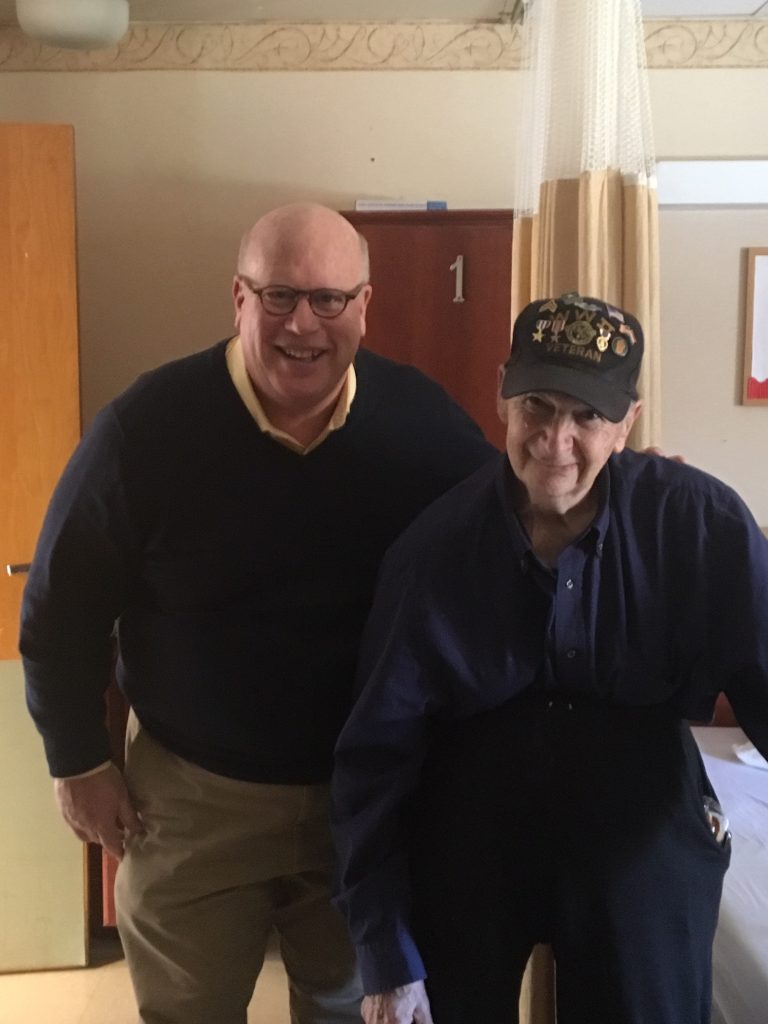

Benjamin Cassidy was looking for a glimpse into his father Walter L. Cassidy’s past. His father was a bazooka man in the U.S. Army’s 87th infantry division, and so, Cassidy, curious to find out more, had embarked on a bit of research when he came upon an old, firsthand account from his father’s bazooka teammate, Arthur Goldschmidt.
He gave Goldschmidt’s name a quick search, and Cassidy was taken aback by what he discovered. A September 2018 piece published in The Moorestown Sun revealed Goldschmidt was alive, well and living in Moorestown. So, Cassidy sought him out. The pair met for lunch this March.
Cassidy recently served as assistant secretary for legislative affairs for the U.S. Department of Homeland Security where he was the department’s principal liaison with Congress. Since leaving the Department of Homeland Security, Cassidy was appointed by President Trump to the board of commissioners for the American Battle Monuments Commission, an agency responsible for maintaining American cemeteries that are located overseas.
Working on the commission and learning more about history made Cassidy curious about his father’s experiences during World War II. He was delighted to learn that Goldschmidt was willing to meet.
So, Cassidy, a Virginia resident, travelled to New Jersey and picked 93-year-old Goldschmidt up on a Saturday afternoon. He said the experience was both profoundly humbling and emotional.
“It was almost like a window into the past,” Cassidy said.
Goldschmidt was 19, and Walter had just turned 20 when they entered the army. Goldschmidt was originally from New Jersey, while Walter hailed from Maine. The pair were bazooka partners with Walter loading and Goldschmidt firing the rocket.
Given they were both assigned to the bazooka, they spent a fair bit of time together. While Goldschmidt was usually the one who fired the bazooka, Walter grabbed the rocket while they were under attack one day. He was ready to fire, but given that he was only three feet away from a brick wall, the blast would have rebounded and injured or killed both Walter and Goldschmidt. Goldschmidt quickly stopped Walter from firing and saved the pair’s lives.
On Jan. 6,1945, their unit was attacked by three tanks. Walter and Goldschmidt managed to get a lucky hit and took out a German Panther tank. To this day, the tank still sits at the end of a street near a farm in Bonnerue, Belgium.
During their time in France, the men were part of the Battle of the Bulge, but after 14 months in the service, Goldschmidt was one of 19 men on the back of a truck when the convoy went over a landmine. Everyone on the truck was killed except Goldschmidt and two other men.
Goldschmidt was blown over the tailgate and fractured his back. He would spend the next nine months in a military hospital.
After he recovered and was back on American soil, Golschmidt knew the town that Walter had lived in prior to the war and tried to track him down. But he had no luck finding Walter and the pair lost touch.
Goldschmidt said Walter had talked about wanting to become a doctor, and during his meeting with Cassidy, he learned that he had become one after all. Cassidy explained his father went to medical school after the war and returned to the army as a medical officer. He went on to run a psychiatric hospital during the Korean War.
Goldschmidt said he was glad to meet a member of Walter’s family and learn what became of him. He said the infantry was full of good men, and they were very much dependent on each other to stay alive during that time.
He said he’s always eager to talk to people about his time in the army. He said the Battle of the Bulge and the hardship of WWII aren’t discussed as much anymore, so it’s been his mission to tell people about it and preserve the history in some way.
“I want people to know about this,” Goldschmidt said.
Cassidy said his biggest takeaway in speaking with Goldschmidt was getting a better understanding of how that moment in time played into the rest of their lives. He said both his father and Goldschmidt had a profound sense of duty and pride in serving that permeated the rest of their lives.
“More than anything else, it was an honor meeting him,” Cassidy said.
Cassidy has plans to keep in touch and is figuring out when he can visit Goldschmidt next.









